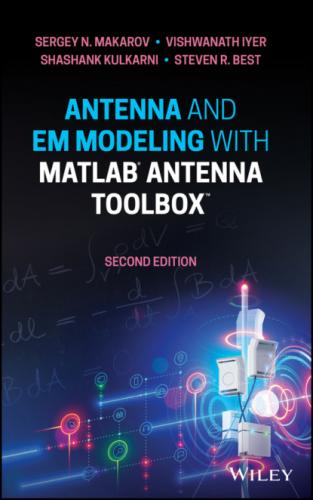SECOND EDITION
Dr. Sergey N. Makarov
Worcester Polytechnic Institute
Worcester, MA, USA
Dr. Vishwanath Iyer
MathWorks, Inc.
Sherborn, MA, USA
Dr. Shashank Kulkarni
MathWorks, Inc.
Khajaguda, Hyderabad, India
Dr. Steven R. Best
MegaWave, LLC
Worcester, MA, USA
This second edition first published 2021
© 2021 John Wiley & Sons, Inc.
Edition History First Edition: © John Wiley and Sons, Inc., New York, 2002
All rights reserved. No part of this publication may be reproduced, stored in a retrieval system, or transmitted, in any form or by any means, electronic, mechanical, photocopying, recording or otherwise, except as permitted by law. Advice on how to obtain permission to reuse material from this title is available at http://www.wiley.com/go/permissions.
The right of Dr. Sergey N. Makarov, Dr. Vishwanath Iyer, Dr. Shashank Kulkarni, and Dr. Steven R. Best to be identified as the authors of this work has been asserted in accordance with law.
Registered Office John Wiley & Sons, Inc., 111 River Street, Hoboken, NJ 07030, USA
Editorial Office 111 River Street, Hoboken, NJ 07030, USA
For details of our global editorial offices, customer services, and more information about Wiley products visit us at www.wiley.com.
Wiley also publishes its books in a variety of electronic formats and by print‐on‐demand. Some content that appears in standard print versions of this book may not be available in other formats.
Limit of Liability/Disclaimer of Warranty MATLAB® is a trademark of The MathWorks, Inc. and is used with permission. The MathWorks does not warrant the accuracy of the text or exercises in this book. This work’s use or discussion of MATLAB® software or related products does not constitute endorsement or sponsorship by The MathWorks of a particular pedagogical approach or particular use of the MATLAB® software. While the publisher and authors have used their best efforts in preparing this work, they make no representations or warranties with respect to the accuracy or completeness of the contents of this work and specifically disclaim all warranties, including without limitation any implied warranties of merchantability or fitness for a particular purpose. No warranty may be created or extended by sales representatives, written sales materials or promotional statements for this work. The fact that an organization, website, or product is referred to in this work as a citation and/or potential source of further information does not mean that the publisher and authors endorse the information or services the organization, website, or product may provide or recommendations it may make. This work is sold with the understanding that the publisher is not engaged in rendering professional services. The advice and strategies contained herein may not be suitable for your situation. You should consult with a specialist where appropriate. Further, readers should be aware that websites listed in this work may have changed or disappeared between when this work was written and when it is read. Neither the publisher nor authors shall be liable for any loss of profit or any other commercial damages, including but not limited to special, incidental, consequential, or other damages.
Library of Congress Cataloging‐in‐Publication Data applied for:
ISBN: 9781119693697
Cover design by Wiley
Cover image: © Andrey Suslov/Shutterstock, sovika/iStock/Getty Images
To our children
Preface and Text Organization
The first edition of this book and the subsequent work of coauthors resulted in MATLAB® Antenna Toolbox™ – a dedicated learning and research software tool for major antenna and array types. Internally, the toolbox uses the Method of Moments (the method of integral equation) for modeling metal and metal‐dielectric antennas. Rao–Wilton–Glisson basis functions on triangular facets are used for the metal parts and edge basis functions on tetrahedra are used for the dielectric parts. Accurate semi‐analytical calculation of near‐field interactions between neighbors facets and tetrahedra assures good solution accuracy.
The Antenna Toolbox has a relatively flexible 2.5D CAD geometry generator and it has an option to import an arbitrary surface antenna or an antenna platform mesh. In addition to multiple programmatic examples, it features over 60 different predesigned antenna configurations grouped by various families such as patch antennas, monopoles, dipoles, spirals, etc. and continues to grow.
In contrast to the first edition devoted to the development of numerical modeling, this second edition is structured differently. It is presented as a succinct yet self‐contained introduction to basic antenna modeling and design with an emphasis on the antenna modeling with the already available MATLAB® Antenna Toolbox. Special attention is paid to small antennas where the Method of Moments remains the most accurate modeling tool. The present text has been used for a one‐semester graduate or a senior‐level undergraduate course for EE/ECE majors and other interested students. It can also be used for an independent study.
The text covers major antenna and array types, and concepts, along with the necessary theoretical background. The text also includes a number of practical antenna/array design examples performed by the authors. Wherever possible, we refer to more comprehensive and fundamental antenna books by C. A. Balanis, W. L. Stutzman, G. A. Thiele, R. C. Hansen, T. Milligan, and the others.
The text organization is shown in Table 1. It includes printed matter, MATLAB® Antenna Toolbox video laboratories, video tutorials, and video lectures, and is targeting either mixed or online material delivery. For running laboratories, MATLAB® 2018 or newer is required with Antenna Toolbox and RF Toolbox installed.
TABLE 1 Organization of printed matter, video laboratories, tutorials, and video lectures. The text content has been tentatively divided into 12 lectures; other arrangements are possible, indeed. Video laboratories (shadowed) teach how to use the Antenna Toolbox.
| # | Topic | Antenna Toolbox laboratory recordings | Lecture recordings |
|---|---|---|---|
| 1 | Antenna circuit model, antenna impedance (Chapter 1 Section 1) | LabSession1.mp4 (10 minutes) | Lecture1_Recording.mp4 (20 minutes) |
| 2 |
Antenna reflection coefficient, VSWR, antenna bandwidth (
|
